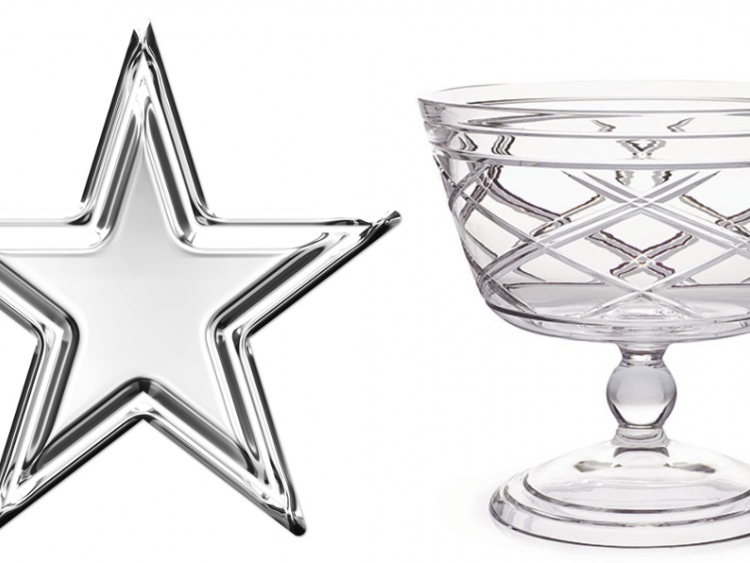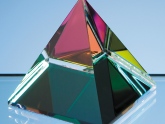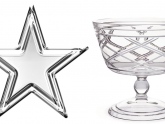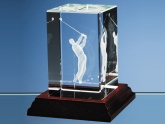
Why Are Crystal Awards More Expensive than Glass?
When celebrating the achievements of staff or rewarding loyal clients, it is customary to want to present individuals with some kind of award, trophy or commemorative plaque at a ceremony or event. This is a lovely way to help recipients remember the occasion and their achievement, and for brand morale to be boosted within the company as a whole.
When holding these kind of events, the first step is choosing an award befitting of the occasion, and two of the most popular choices are glass and crystal awards. At first glance, crystal awards might look very similar to glass ones - they're both clear, sparkly and elegant. Therefore, it can come as a surprise to people that crystal awards usually cost a little more. We are often asked what the differences are between crystal and glass, and why crystal warrants that little bit extra in terms of price.
What is the Difference Between Glass and Crystal?
The term glass is used broadly to describe a transparent substance containing the chemical compound silica (the primary constituent of sand) that transmits, reflects and refracts light. Glass is a material with a wide range of uses and, accordingly, there are a wide range of substances that can be combined with silica to produce glass, such as lime, magnesia and alumina. One of the most common kinds of glass is soda-lime glass, which is used to make a range of everyday items, from lightbulbs to drinking glasses.
 An engraved award made from jade coloured glass
An engraved award made from jade coloured glass
Crystal is actually another type of glass that, unlike soda-lime glass and other types, contains lead. Lead crystal has a very high density and high elasticity, making it stronger and also more workable when it is being shaped. The lead content of crystal ranges from 10-30% in Europe. Unless you know the chemical composition of a piece of glass, it can be difficult to tell at first whether it is regular glass or lead crystal.
 This is a crystal award - were you able to guess just from looking?
This is a crystal award - were you able to guess just from looking?
How to Distinguish Crystal from Glass
Clarity -When held up to the light, soda-lime glass can look slightly cloudy. Crystal, on the other hand, looks perfectly clear. It is also a better refractor, meaning that when a crystal award is placed in the sun it will sparkle and produce a rainbow prism where the sun shines through it. Because of its clarity crystal is often the chosen wine-glass material of wine connoisseurs, who want to appreciate the colour of their wine before tasting it.
Thickness - Because crystal is easier to sculpt at low temperatures, it can be spun thin and still retain its durability and strength. This means you are more likely to find very thinly spun crystal in delicate shapes, as opposed to slightly thicker glass. Crystal can be spun very thin whilst still retaining its strength so is perfect for slender champagne flutes
Crystal can be spun very thin whilst still retaining its strength so is perfect for slender champagne flutes
Cut - Glass will have a slightly rougher surface texture than crystal, which is very smooth to the touch. The design of crystal objects is often more ornate because of its strength and elasticity, which allow beautiful designs to be done to the highest quality.
Weight - Because it is denser, crystal is typically heavier than glass. If you compare two glass objects of the same size and one weighs more, it is likelier to be crystal.
 Crystal is often used for chandeliers because its clarity makes it ideal for allowing light to pass through
Crystal is often used for chandeliers because its clarity makes it ideal for allowing light to pass through
Sound - When tapped, glass and crystal produce a different sound. If you hold the object close to your ear and lightly tap near the base, crystal will make a high-pitched 'ping' sound, whilst glass produces a sound more like a thud.
Should You Choose a Glass or Crystal Award?
As we have seen, crystal is more expensive because it is stronger, can be moulded into more delicate shapes and has a greater clarity than glass. But that doesn't necessarily make it the better choice of material for an award in all circumstances.
We would recommend crystal awards in the following instances:
For elegant award ceremonies - If you are hosting a black-tie, one-off ceremony to recognise outstanding achievements, crystal awards will be more in keeping with the style of the event.
To reward long-standing clients - For clients that have been consistently loyal to your business for a significant period, perhaps years or even decades, a crystal award is a more fitting tribute to signify your appreciation. A crystal award that shines and sparkles will add an extra touch of luxury to a black-tie event
A crystal award that shines and sparkles will add an extra touch of luxury to a black-tie event
When cost is not the most important factor - If you are holding a fancy award ceremony, you probably have a fairly healthy budget with no reason to scrimp on the quality of the award.
However, glass awards are more appropriate in these instances:
For less prestigious or more informal events - You might be holding a company sports day, or have a bi-annual award ceremony for best salesman in your company. For these types of events, glass awards are perfectly fitting and will be much appreciated by the recipient.
 Would you be able to tell that this is glass not crystal without us telling you?
Would you be able to tell that this is glass not crystal without us telling you?
When you have a tight budget - Smaller companies often want to celebrate achievements, but don't have the money to go all out on a swanky event. Glass awards are a great option in this case, as they can look just as beautiful, and won't break the bank.
If you have more questions regarding the differences between crystal and glass, or would like to know which material is right for your award ceremony, please don't hesitate to get in touch on 01204 577 995.
Talk to Us
»
01204 577 995
info@UKCorporateGifts.co.uk














